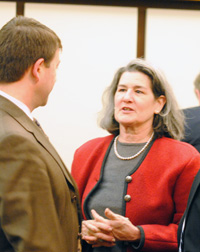Washtenaw County board of commissioners meeting (Feb. 16, 2011): The county board’s four-hour meeting on Wednesday evening was punctuated by a heated debate about whether some of their meetings are sufficiently in the public eye.

Washtenaw County treasurer Catherine McClary, right, talks with deputy county administrator Bill Reynolds before the start of the Feb. 16, 2011 board of commissioners meeting. McClary delivered her annual treasurer's report during the meeting. (Photos by the writer.)
Ronnie Peterson started that debate by advocating for holding the board’s budget retreats and administrative briefings at the boardroom table, where they can be televised. The meetings are open to the public, but are more informal and not available on Community Television Network or online webcasts. The ensuing discussion revealed different perspectives on what kind of environments are most conducive to deliberations. At one point, board chair Conan Smith – who opposed a change of venue – argued that deliberations aren’t subject to the state’s Open Meetings Act. The county’s attorney, Curtis Hedger, advised the board that, in fact, deliberations do need to occur in open meetings, with limited exceptions allowed in closed sessions.
After roughly 90 minutes of debate, the board voted – with Smith dissenting – to hold future budget retreats in the boardroom following their bi-weekly working sessions. The retreats will be televised. An effort to relocate and televise administrative briefings failed, however, with support only from Peterson, Kristin Judge and Wes Prater.
In other business, the board appointed three staff members to a review committee that’s part of a new coordinated effort for funding human services nonprofits in the county. During a presentation by Mary Jo Callan – head of the office of community development, which is overseeing this process – Peterson expressed concern that smaller, community-based nonprofits will be unable to compete in this new system. Callan assured him that she understood his concerns, but felt that this new model could actually be better for those nonprofits. She noted that the board would ultimately control funding decisions for county dollars.
Catherine McClary, the county treasurer, delivered her annual treasurer’s report, giving an update on the county’s investment portfolio, delinquent taxes and foreclosures. She reported that the amount of residential tax foreclosures appears to be stabilizing, but foreclosures of commercial property are on the rise, especially for parcels of vacant, undeveloped land. Separately, the board approved the treasurer’s annual request to borrow funds – up to $50 million this year – to temporarily cover delinquent taxes in the county’s 80 taxing jurisdictions. Last year, there was about $29 million in delinquent taxes, and McClary expects a small increase this year.
McClary also told commissioners that later this year she’ll be asking them to approve a civil infractions ordinance for dog licenses, as part of a stepped-up enforcement effort. Right now, not having a license is a criminal misdemeanor of 90 days in jail or a $500 fine.
During Wednesday’s meeting commissioners also delivered several liaison reports, including news that the Washtenaw County Parks & Recreation Commission had approved $600,000 for the Connecting Communities trail program. Part of those funds will support a project that will eventually link Saline and Ann Arbor through a non-motorized pathway. The commission also authorized $250,000 to build a boathouse and fishing dock at Ford Lake, in partnership with the state and Eastern Michigan University. [Full Story]




